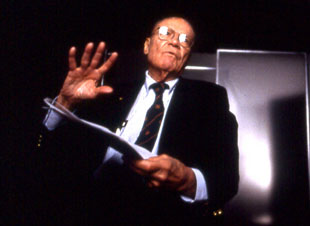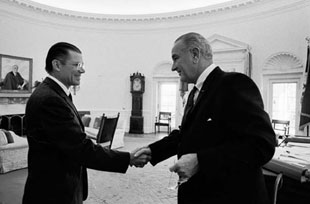Under Arts + entertainment, Movies

I finally had a chance over the weekend to watch Errol Morris’ documentary The Fog of War: Eleven Lessons from the Life of Robert S. McNamara. Fog of War features former US Secretary of Defence Robert McNamara and the lessons he learned during the course of his career about the nature of modern warfare.
McNamara gives us some candid thoughts into some of the most important conflicts of the 20th century, from the perspective of an instrumental player. From his role in WWII in the Air Force to being hand picked as Secretary of Defence by John F. Kennedy, and serving later under Lyndon Johnson, McNamara is able to reveal interesting insights into those conflicts such as:
- Generals and government officials of the Allied forces, if they had lost against Japan in WWII, would most likely have been tried as war criminals for the way they indiscriminantly flattened dozens of Japanese cities, slaughtering civilian populations that numbered in the hundreds of thousands. This of course was topped off by dropping the nuclear bomb on Hiroshima and Nagasaki killing and poisoning many more.
- How frighteningly close the US and USSR came to nuclear war during the Cuban Missile Crisis, averted by empathy and understanding, and a lot of luck. (Incidentally, the film Thirteen Days gives a good insight into the whole Cuban Missile Crisis situation – if you can put up with Kevin Costner and Massachusetts accents…)
- Upon meeting his Vietnamese counterpart in the 1990s, realising the gross mutual misunderstandings between the US and Vietnamese governments. McNamara points out that the US was battling against a communist domino effect within the region and against Vietnam being taken over by the Chinese. What his Vietnamese counterpart then passionately pointed out was that if only the US had made more of an effort to understand the Vietnamese, they would have realised that they were fighting a war of independence, and had fought against the Chinese for a thousand years. They saw the Americans as yet another colonial power, stepping in for their own interests.
- McNamara’s middle name is “Strange”.

McNamara stops short of admitting guilt over the Vietnam war, and is not completely candid in all areas. He repeatedly attempts to justify his and his government’s actions, while illustrating the regret he feels, particularly in regards to the Vietnam war. It’s interesting to note that under JFK, McNamara’s efforts were moving towards withdrawal from Vitenam, but after JFK’s death, the US under Johnson moved to a greater presence in Vietnam, and full-blown war. A good quote from McNamara in the film is:
“If we can’t persuade nations with comparable values of the merits of our cause, we’d better reexamine our reasoning.”
This particular insight, as well as many others provide wisdom and are especially relevant in today’s conflicts.
Fog of War is not a masterpiece, but well deserving of the 2004 Best Documentary Oscar and thoroughly interesting.
One comment
2:09 pm
A great film. It’s a shame Rumsfeld et al. haven’t learnt from the US experience in Vietnam. They might not be bogged down in Iraq, otherwise.